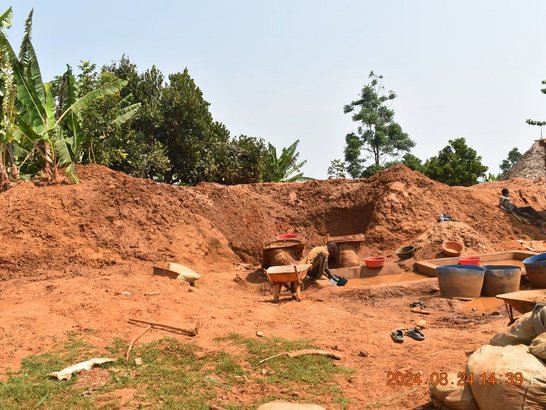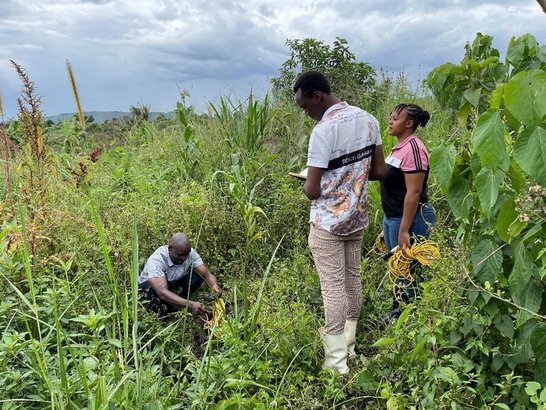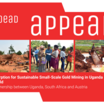Biosorption for Sustainable Small-Scale Gold Mining in Uganda

Project coordinator: Dr. Mary Therese Kaggwa
Coordinating institution: Kyambogo University
Partner institutions: University for Continuing Education Krems (Dr. Nils Haneklaus), Makerere University (Dr. Peter Akoll), Gulu University (Dr. Denis Nono), University of Pretoria (Prof. Hendrik Brink)
Partner countries: Uganda, South Africa
Project duration: 1 March 2024 - 28 February 2027
Budget: EUR 388.511,92
Project Overview
Artisanal and small-scale gold mining (ASGM) is an important source of livelihood for the rural poor and vulnerable communities, including children, women and marginalised groups. The sector produced nearly 7000 kg of gold, equivalent to 3.5% of Uganda's gross domestic product. Over 73% of Uganda's ASM gold is produced using over 15,000 kg of mercury per year (an average of 4 g of mercury per 120 kg of gold ore), resulting in significant and long-lasting mercury contamination. In addition, various toxic heavy metals such as lead, arsenic, cyanide, iron and uranium associated with gold mining are rarely recovered and therefore remain in the tailings, contaminating and persisting in receiving waters and soils. In addition, the burning of gold-mercury amalgam volatilises mercury in the atmosphere, which returns and contaminates soil and water through precipitation. Crops grown on contaminated soils absorb and accumulate the mercury and heavy metals. In the aquatic environment, organisms ingest the mercury and heavy metals in water and food, which accumulates along the food chain. Subsequently, the consumption of contaminated food and aquatic organisms transfers the accumulated and concentrated mercury and heavy metals to humans, causing adverse health effects. Despite the human and environmental concerns, there is a lack of efficient and affordable technologies for the remediation of mine waste and the rehabilitation of contaminated soils and tailings that are suitable for the resource-poor environments characteristic of developing countries.
The aim of the Biogold project is to reduce the contamination of food grown in mercury and heavy metal contaminated soils and to protect the fragile ecosystems surrounding ASGM areas in Uganda. To this end, Biogold will design and pilot a bioremediation technology that combines biosorption and chemical mechanisms to treat mine effluents and remediate contaminated soils and tailings, and build capacity of researchers and local communities in the safe handling and management of mercury and general heavy metal bioremediation. The objectives include: i) capacity building through the development of a graduate curriculum to provide skills and competencies in the field, support graduate training and research, and organise targeted training for miners and communities; ii) Developing and piloting treatment technologies for soil and wastewater remediation or treatment in ASGM; and iii) Promoting gender and diversity inclusion for rapid adoption of treatment technologies in ASGM communities.
Key Outputs
Outputs will include:
- Approved MSc. Curriculum in Environmental Science in Kyambogo
- Three MSc students trained
- Miners and community trained in proper use and disposal of mercury
- Optimised bio-absorbent developed for efficient removal of mercury and other heavy metals from contaminated soils, wastewater and tailings
- Decontaminated soils suitable for agriculture
- Wastewater and tailings safe for disposal in the receiving environment
- Technology adopted by the community for mercury removal in soils and water from gold mine
- Increased visibility of the partner universities in the communities through their contribution to addressing national social, health and economic challenges.
In conclusion, the BioGold project represents a critical step towards mitigating the negative impacts of mercury-based ASGM. By combining scientific innovation with community engagement and a focus on vulnerable populations, the project will create a sustainable and healthier environment. This approach aligns well with the broader goals of environmental protection, economic empowerment and public health.
Reporting

BioGold | Report on the 1st project year | (March 2024 - February 2025)
The project aims to combine biosorption and chemical remediation techniques to treat contaminated wastewater and tailings, and rehabilitate contaminated soils, thereby safeguarding vulnerable ecosystems around artisanal gold mining (ASGM) areas in Uganda. The biochar composites will be developed from locally available biomass to make them suitable for remediation of the soils for agricultural purposes.

